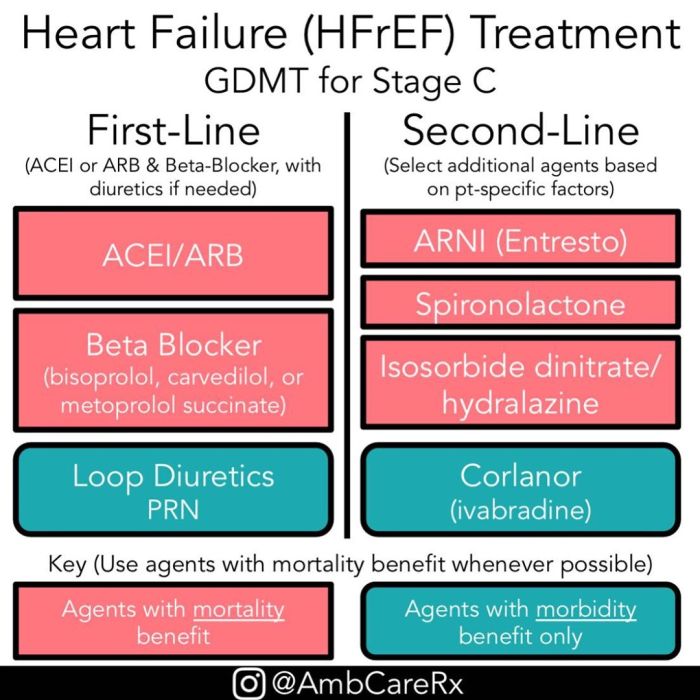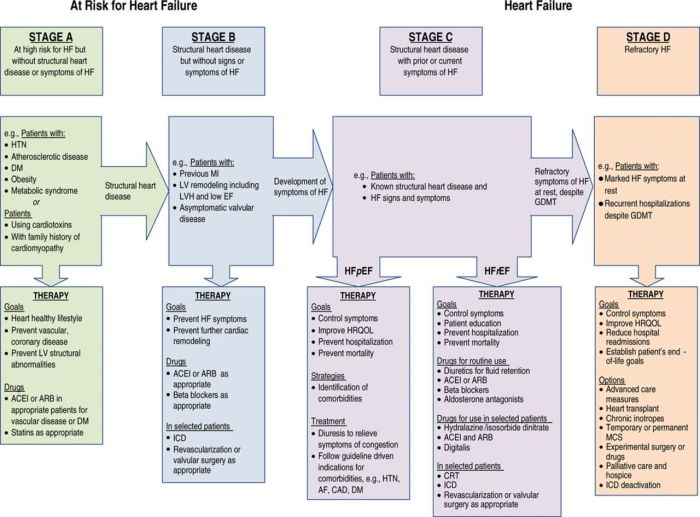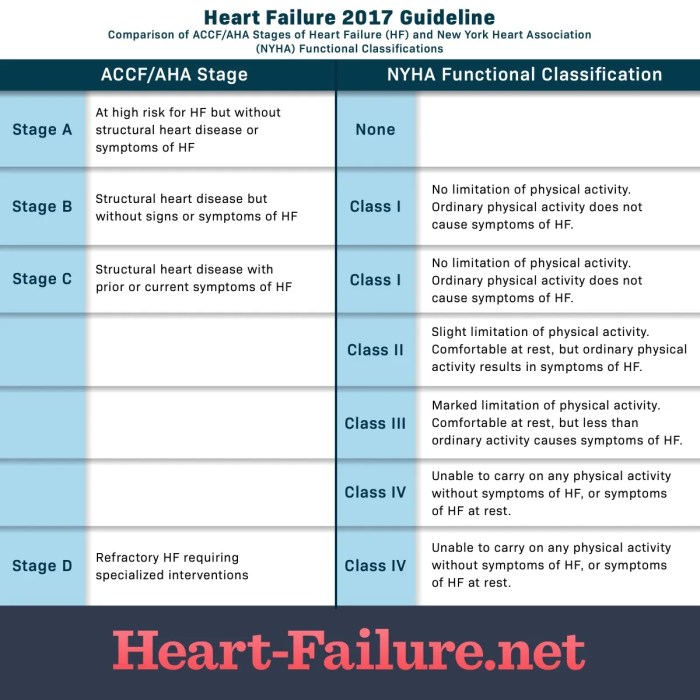Hf medical abbreviation – HF, or heart failure, is a serious medical condition that affects millions worldwide. This medical abbreviation represents a complex and often debilitating condition that can significantly impact a person’s quality of life. In this comprehensive guide, we delve into the intricacies of HF, exploring its definition, symptoms, diagnosis, treatment options, and essential management strategies.
The consequences of heart failure can be far-reaching, extending beyond physical limitations to encompass emotional and psychological well-being. As we navigate this topic, we aim to provide a clear understanding of HF, empowering individuals with the knowledge and resources necessary to effectively manage their condition and improve their overall health outcomes.
Treatment Options for HF
Heart failure (HF) is a complex condition that requires a comprehensive treatment approach. The primary treatment options include medications, lifestyle modifications, and surgical interventions. Each approach has its own benefits and risks, and the choice of treatment will depend on the individual patient’s needs and preferences.
Medications
Medications are the cornerstone of HF treatment. They work by improving the heart’s pumping ability, reducing fluid retention, and preventing blood clots. Common medications used for HF include:
- ACE inhibitors
- Angiotensin II receptor blockers (ARBs)
- Beta-blockers
- Diuretics
- Ivabradine
Medications can effectively improve symptoms and reduce the risk of hospitalization and death in patients with HF. However, they can also cause side effects, such as dizziness, fatigue, and low blood pressure. It is important to work closely with a doctor to find the right medication and dosage for each patient.
Lifestyle Modifications
Lifestyle modifications can play a significant role in managing HF. These modifications include:
- Eating a healthy diet
- Exercising regularly
- Losing weight if overweight or obese
- Quitting smoking
- Limiting alcohol intake
Lifestyle modifications can help improve heart health, reduce symptoms, and slow the progression of HF. However, they can be challenging to maintain, especially for patients with severe HF. It is important to set realistic goals and work with a doctor or other healthcare professional to develop a plan that is tailored to the individual patient’s needs.
Surgical Interventions
Surgical interventions may be necessary for patients with severe HF who do not respond to medications or lifestyle modifications. Surgical interventions for HF include:
- Coronary artery bypass grafting (CABG)
- Valve repair or replacement
- Heart transplant
Surgical interventions can improve symptoms and prolong life in patients with severe HF. However, they are also major procedures that carry significant risks. It is important to discuss the benefits and risks of surgery with a doctor before making a decision.
Management and Prevention of HF: Hf Medical Abbreviation

Managing heart failure involves regular monitoring and follow-up care to track the condition’s progression and adjust treatment as needed. Lifestyle changes, including diet, exercise, and stress reduction, play a crucial role in preventing or managing heart failure.
Regular Monitoring and Follow-Up Care
Regular monitoring and follow-up care are essential for individuals with heart failure. These appointments allow healthcare providers to assess the effectiveness of treatment, monitor for any changes in the patient’s condition, and make necessary adjustments to the treatment plan.
During these visits, the healthcare provider may perform physical examinations, review medications, and order tests such as blood tests, chest X-rays, and echocardiograms to evaluate the heart’s function and overall health.
Lifestyle Changes, Hf medical abbreviation
Lifestyle changes can significantly impact the prevention and management of heart failure. These changes include:
Diet
Maintaining a heart-healthy diet is crucial for individuals with heart failure. This involves limiting sodium intake, which can help reduce fluid retention and improve heart function. It also includes eating plenty of fruits, vegetables, and whole grains, which provide essential nutrients and antioxidants.
Exercise
Regular exercise can strengthen the heart and improve its pumping ability. It also helps reduce blood pressure, improve cholesterol levels, and promote weight loss. However, it is important to consult with a healthcare provider before starting an exercise program to determine the appropriate type and intensity of exercise.
Stress Reduction
Chronic stress can contribute to heart failure by increasing blood pressure and heart rate. Managing stress through techniques such as yoga, meditation, or deep breathing exercises can help improve heart health and reduce the risk of heart failure.
Related Medical Terms and Abbreviations

Heart failure is often accompanied by various medical terms and abbreviations that healthcare professionals use to describe specific aspects of the condition. Understanding these terms can help patients and caregivers better comprehend the diagnosis and treatment plan.
Common Medical Abbreviations Related to Heart Failure
- EF (Ejection Fraction):A measure of the percentage of blood pumped out of the heart’s left ventricle with each contraction. A normal EF is typically above 55%, while a value below 40% indicates heart failure.
- LVEF (Left Ventricular Ejection Fraction):Specifically measures the ejection fraction of the heart’s left ventricle, which is responsible for pumping oxygenated blood to the body.
- BNP (Brain Natriuretic Peptide):A hormone released by the heart in response to increased pressure or stretching. Elevated BNP levels can indicate heart failure or other cardiac conditions.
These abbreviations provide valuable information for healthcare providers to assess the severity of heart failure, monitor its progression, and adjust treatment strategies accordingly.
Patient Education and Resources

Patient education plays a pivotal role in the management of heart failure. Equipping individuals with comprehensive knowledge about their condition empowers them to make informed decisions regarding their treatment and lifestyle choices, ultimately improving their health outcomes and quality of life.
Numerous patient education materials and resources are available, including brochures, online platforms, and support groups. These resources provide valuable information on:
Understanding Heart Failure
- Causes and risk factors
- Symptoms and signs
- Types of heart failure
- Prognosis and life expectancy
Managing Heart Failure
- Medications and their side effects
- Lifestyle modifications (e.g., diet, exercise, smoking cessation)
- Monitoring and managing symptoms
- Preventing complications
Emotional and Social Support
- Coping with the emotional challenges of heart failure
- Finding support from family, friends, and healthcare professionals
- Connecting with support groups and online communities
Wrap-Up
In conclusion, HF is a multifaceted medical condition that requires a comprehensive approach to diagnosis, treatment, and management. By understanding the implications of this abbreviation, individuals can actively participate in their healthcare journey, making informed decisions and adopting lifestyle modifications that can significantly improve their quality of life.
Regular monitoring, adherence to treatment plans, and open communication with healthcare providers are crucial for successful HF management. Remember, knowledge is power, and in the face of heart failure, knowledge can empower us to live longer, healthier, and more fulfilling lives.
Expert Answers
What are the most common symptoms of HF?
Shortness of breath, fatigue, swelling in the legs, ankles, and feet, and persistent coughing are common symptoms of HF.
How is HF diagnosed?
Diagnosis typically involves a physical exam, medical history review, blood tests, chest X-ray, and echocardiogram (ultrasound of the heart).
What are the treatment options for HF?
Treatment options may include medications, lifestyle modifications (e.g., diet, exercise), and in some cases, surgical interventions such as pacemakers or heart transplants.
Can HF be prevented?
While not all cases can be prevented, adopting a healthy lifestyle, managing underlying conditions (e.g., high blood pressure, diabetes), and quitting smoking can reduce the risk of developing HF.